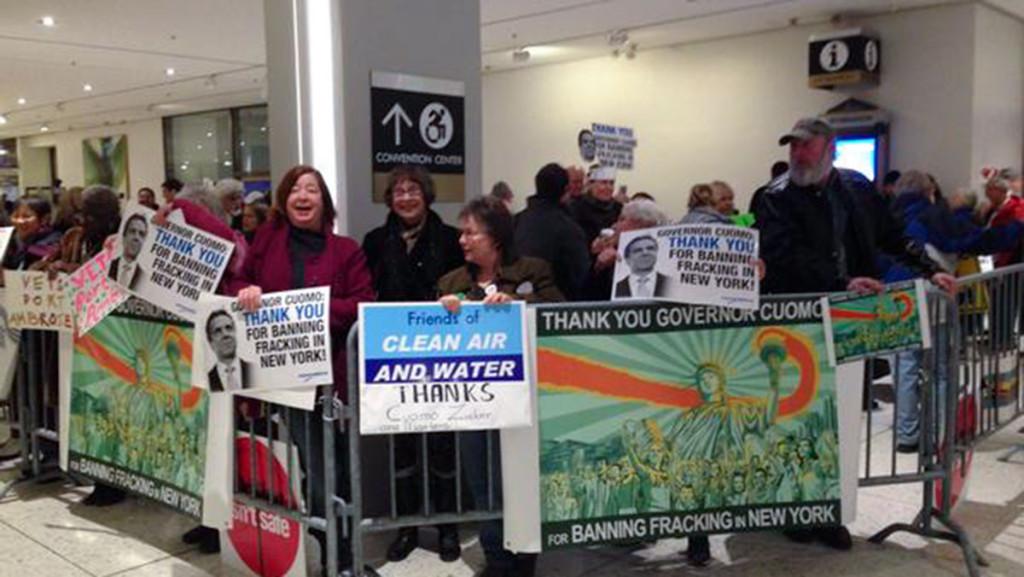Hundreds of activists rallied inside the halls of the Empire State Convention Center in Albany before Gov. Andrew Cuomo’s annual State of the State address on Jan. 21, this time in celebration.
“For many years, we’ve rallied for a ban on fracking outside the address,” John Armstrong, spokesperson for Frack Action, said. “This year, it’s to celebrate, thank him and promote renewable energy.”
Cuomo announced a statewide ban on high-volume hydraulic fracturing at his Dec. 17 cabinet meeting. Armstrong said Frack Action, a New York–based advocacy group against high-volume hydraulic fracturing (HVHF), has been campaigning for the issue for the past six years.
The ban is the first by a state with significant natural gas resources, placing Cuomo at the forefront of the cheers from environmentalists concerned with health risks, and at a crossroads with conservative economists.
Joseph Martens, Department of Energy Conservation (DEC) commissioner, said at the meeting that the next step to be completed early this year is publishing a finalized Supplemental Generic Environmental Impact Statement and issue a legally binding findings statement prohibiting HVHF in the state.
The SGEIS, last updated in 2013, proposed increased regulations to supplement drilling permit conditions in the first Environmental Impact Statement drafted by the DEC in 2008. Martens said both statements, thousands of pages long, had been submitted for public review and involved the Department of Health (DOH).
“In the last two years, substantial new information regarding HVHF’s environmental and public impacts has come to light,” he said. “As a result, DOH has broadened its inquiry.”
The ban prohibits fracking in the state, but it does not affect current leases that landowners have signed with oil and gas companies, which will expire as scheduled.
Fracking is also different from conventional gas drilling, which involves vertical wells straight down into sedimentary rock containing natural gas, Chris Sinton, local geologist and assistant professor of environmental studies and sciences at Ithaca College, said. Since Marcellus Shale, sedimentary rock in the Northeast, is not very permeable, conventional drilling would access little gas, but applying high pressure water and sand with horizontal drilling — hydraulic fracturing — cracks the rock, and the sand keeps the cracks open, he said. In New York, the highest concentrations of shale rock are in the Southern Tier.
When Ellen Harrison, a resident of Caroline, New York, leased her mineral rights in 2008 to Anschutz Exploration Corporation, she said the decision was based on the perception that she might benefit others’ needs for gas from conventional drilling.
“We felt, well, we use gas, it wasn’t fair to make other people do it,” she said about signing the lease. “We didn’t think it was going to be a big deal. Then I saw a film about fracking in Colorado and completely freaked out.”
Harrison said it was after discovering the nature of fracking that she formed Fleased, an educational organization that informs people of the implications of signing a gas lease, helps people who wish to break their leases and discourages others from signing future ones.
On the other end of the leases, the domestic market of oil and gas trade was one of the topics of discussion at an American Petroleum Institute press conference on Jan. 6.
Following his State of American Energy address, Jack Gerard, API president and CEO, said Cuomo’s decision was not conducive to the oil and gas marketplace in terms of the availability of well-paying jobs.
“It’s a bit ironic that after years of looking at this question, with no new research, only looking at current data that’s already on the books, the State of New York and the governor has concluded something exactly the opposite that everybody else in the United States has concluded,” he said.
DOH Commissioner Howard Zucker used this uncertainty to reinforce his conclusion supporting the ban.
“The potential risks are too great; in fact, they are not even fully known,” he said at the cabinet meeting. “Relying upon the limited data that is presently available to answer the public health risks would be negligent on my part.”
In addition to the impacts to air, land and water that Martens listed at the cabinet meeting, Zucker said there are public health impacts to consider.
“There are many red flags because scientific issues have not yet been comprehensively studied through rigorous scientific research at this time,” he said.
Such scientific inquiry is only now beginning within the last two years, he said, which means extensive results will not be available for several years.
“We don’t have definitive evidence to prove or disprove the claims of health effects,” he said. “The science isn’t there, but the cumulative concerns based on the information I’ve read gives me reason to pause.”
Zucker said he based his conclusion ultimately on the cycle of history: the adverse effects of smoking tobacco, for example, were not public knowledge for a long time after people began doing it.
“Prevention is the cornerstone of public health — it is all that we do,” he said.
Harrison said the case for a ban, therefore, was strengthened by the work of local activists.
“Without the science, there would have been no underpinning to place the ban, but without the activism, the ban wouldn’t have happened,” she said.








